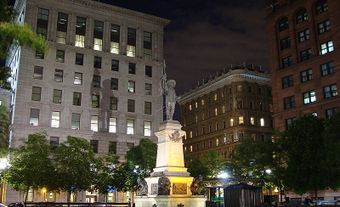
François de Laval, first bishop of Québec (born François-Xavier de Montmorency-Laval de Montigny on 30 April 1623 in Montigny-sur-Avre, France; died 6 May 1708 in Québec). The first Roman Catholic bishop of Québec, Laval was beatified in 1980 and canonized in 2014. Both the city of Laval and Université Laval were named in his honour.
Destined for the church at age eight, a would-be missionary, Laval was initially a political pawn. For 10 years he studied with the Jesuits, who nominated him for bishop of Québec in opposition to a Sulpician candidate, de Queylus, who would have kept the Canadian church within the crown-controlled state church of France, and who wanted to control the Jesuit missionaries serving the European colonists. To preserve their independence, the Jesuits, supported by the queen-regent and other notables, promoted Laval.
"He Listens to No One"
In defiance of French bishops and the parlements of Rouen and Paris, a papal nuncio in 1658 consecrated Laval bishop of Petraea, a diocese in Muslim lands — there being no diocese of Québec yet. Although he swore allegiance to the French king, Laval was the pope's vicar-general. After his arrival at Québec in June 1659, Laval asserted his primacy over de Queylus and rejected the governor's claim to precedence in religious ceremonies. Before leaving Canada, Governor Voyer d'Argenson wrote of Laval's "adherence to his own opinions and ... zeal that bore him beyond his mandate ... that he listens to no one." On his authority and on morality, Laval was inflexibly single-minded. Although willing to compromise on some issues, such as the scale of tithes, he fought an unrelenting battle against the liquor trade with the Aboriginal population. With the king's backing and by quiet determination, Laval outlasted vociferous opponents, including governors.
His goal was a diocese of Québec in which all religious were subject to the bishop. To reduce lay control of the clergy, Laval instituted a church court to judge cases involving clerics. In 1663, he founded the Séminaire de Québec as a theological college and a mother house of all secular priests. Curates could be recalled at will and their parishioners' tithes went to the seminary. His reluctance to appoint permanent, resident curates — as was done in France — was criticized. He replied that, until he was bishop of Québec, he could not lawfully create new parishes for curates.
New Churches, Schools and Good Works
Louis XIV's aggressiveness towards the papacy made Rome delay creation of the Québec diocese. Laval left Canada in 1671 determined not to return except as Québec's bishop; his wish was granted in 1674. Although his faith was austere and self-denying, it was charitable and practical. It resulted in new churches, schools and good works. He resisted any multiplication of religious orders as a burden on the colonists and a threat to the centralized church structure. The king financed Laval's work while containing the bishop's ambitions. The bishop and the Jesuits were counterbalanced by royal protection for the Sulpicians and the reintroduction of the Franciscans, loyal crown agents.
In 1685, infirmity and advancing age prompted Laval to offer his resignation as bishop, although he agreed to remain until the consecration of his successor, Jean-Baptiste de La Croix de Saint-Vallier, which took place in 1688. Laval's church seemed firmly established. His headstrong, tactless and improvident successor was a disappointment. With pained and silent resignation, Laval watched the young bishop undo much of his work. In 1700 Saint-Vallier was detained in France, and thereafter Laval acted as bishop of Québec until his own death.
Laval's episcopacy had two great consequences. His seminary for colonial priests facilitated the "Canadianization" of the clergy so that, after the British Conquest, the Roman Catholic Church was the national church of French Canada. By keeping his diocese independent of any French see, but still linked to Rome, Laval prepared the way for the Ultramontane politics of 19th-century Québec.
Canonization
In 1980, Laval, Marie de l’Incarnation, and Jose de Anchieta (the “Apostle of Brazil”) were officially declared “Blessed” by Pope John Paul II (this process is known as beatification and is often a step towards canonization, or the declaration of sainthood). On 3 April 2014, Pope Francis declared all three saints, using a process known as “equivalent canonization,” which does not require the verification of miracles made through the saints’ intervention. The canonization was celebrated on 12 October 2014 during the Thanksgiving mass at St. Peter’s Basilica in Rome. Cardinal Gérald Cyprien Lacroix, Archbishop of Québec, led a delegation from Québec which attended the ceremony.

 Share on Facebook
Share on Facebook Share on X
Share on X Share by Email
Share by Email Share on Google Classroom
Share on Google Classroom

